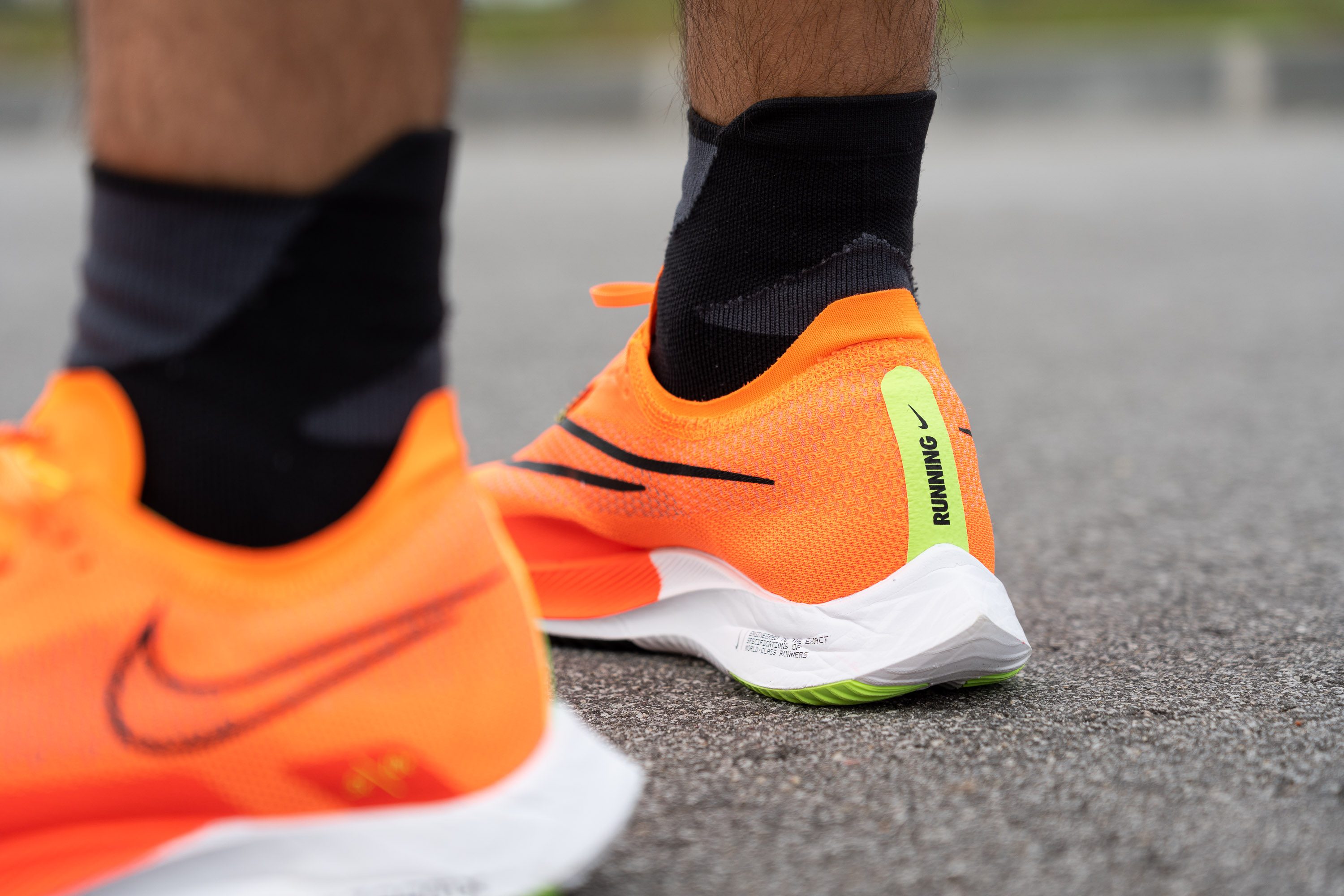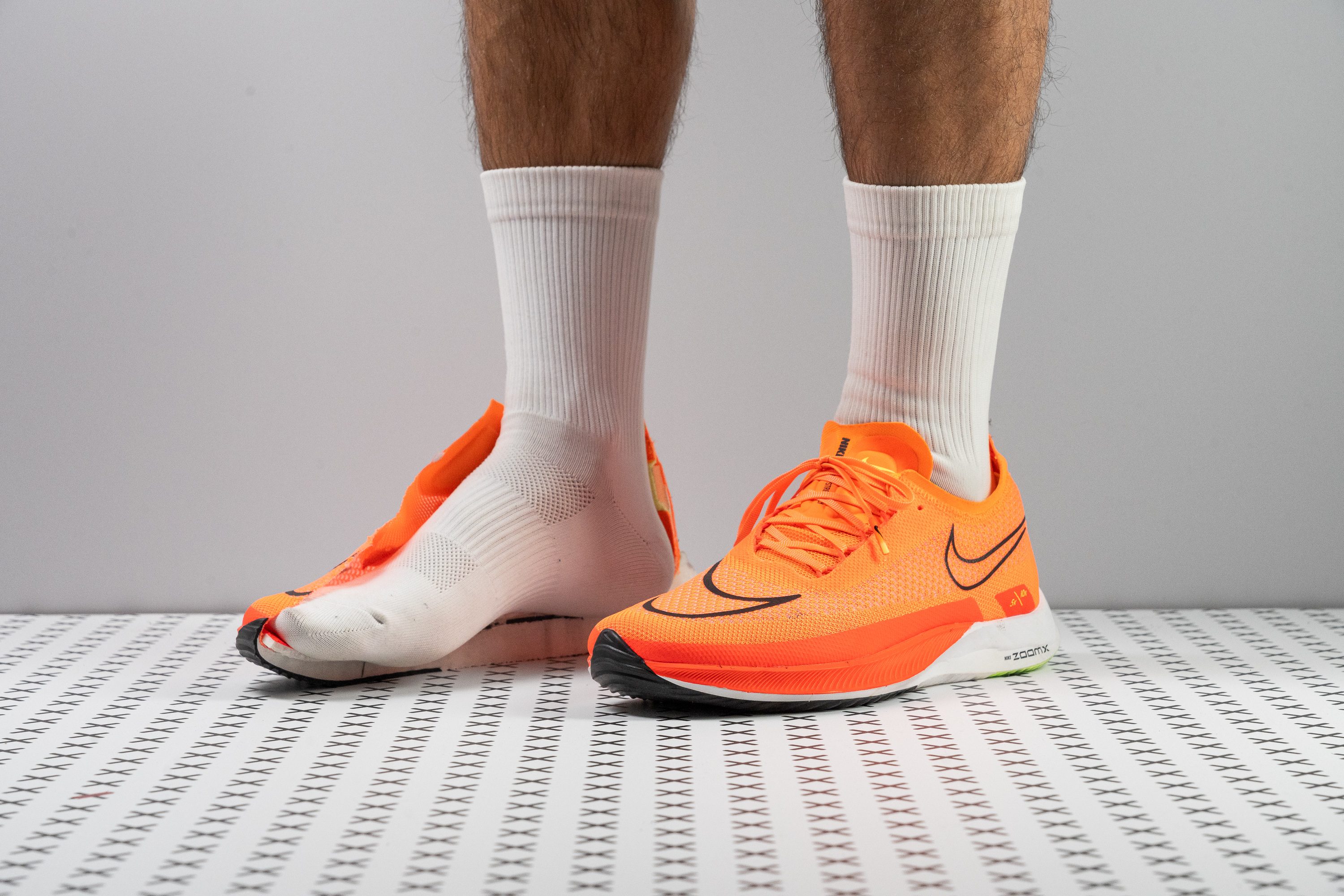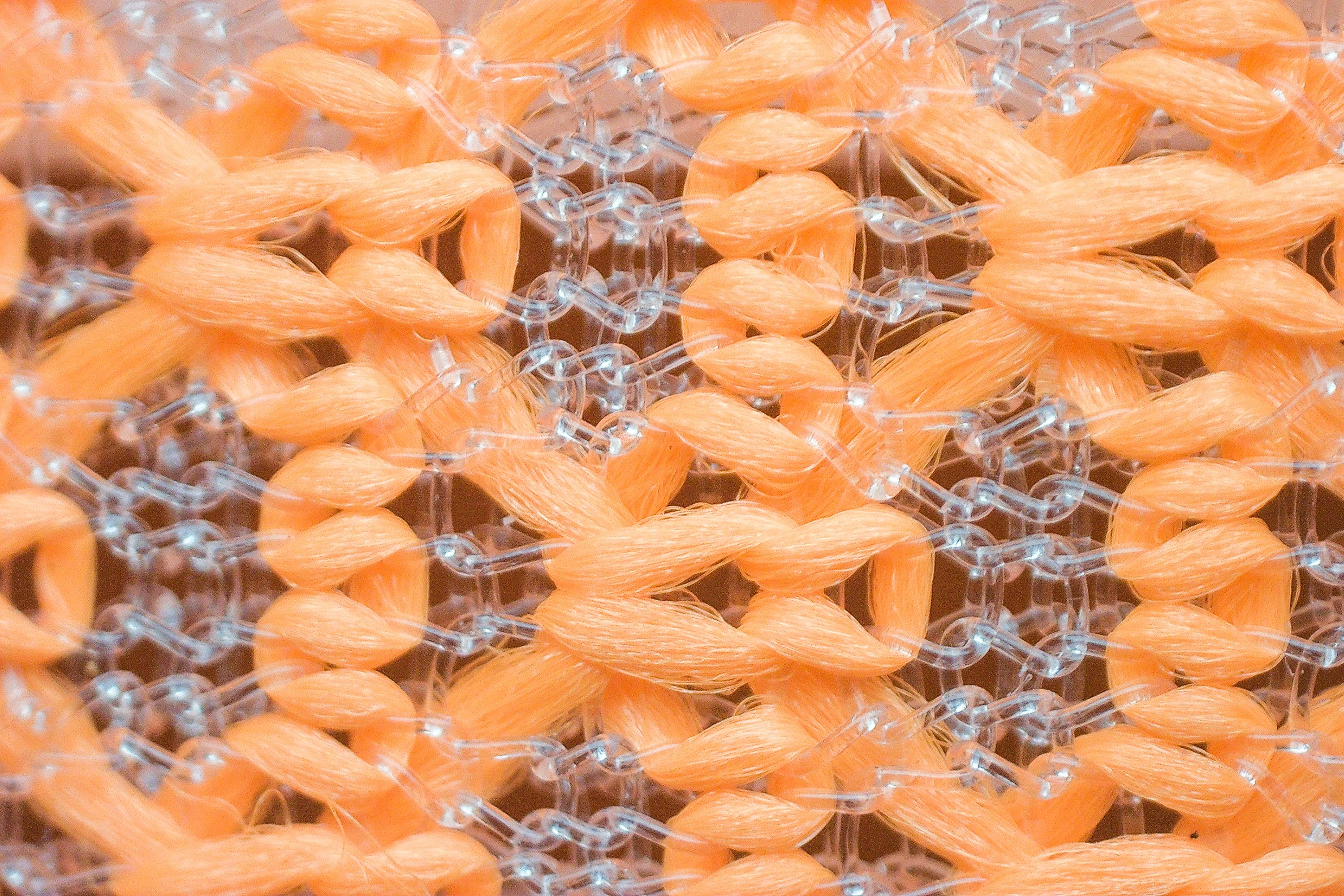Our verdict
- Our top pick in best lightweight running shoes
- Our top pick in best Nike road running shoes
Pros
- Screams fast and speed-ready
- Nike’s lightest racing shoe yet
- Stable and good at cornering
- Incredible lockdown
- Splendid track workhorse
- Roomy toe box
- Grippy outsole
- Eye-catching design
- Not so expensive!
Cons
- Narrow-footed runners may experience poor lockdown
- Insanely thin laces
- Falls short for racing
- Heavy runners can “bottom out”
Audience verdict
Comparison
The most similar running shoes compared
+ + Add a shoe | |||||
|---|---|---|---|---|---|
| Audience score | 86 Good! | 86 Good! | 89 Great! | 89 Great! | |
| Price | $160 | $150 | $130 | $180 | |
| Pace | Speed training | Speed training | Speed training | CompetitionSpeed training | |
| Arch support | Neutral | Neutral | Neutral | Neutral | |
| Weight lab Weight brand | 6 oz / 171g 6 oz / 171g | 5.3 oz / 149g 4.9 oz / 139g | 7.4 oz / 210g 7 oz / 198g | 7.1 oz / 200g 6.9 oz / 196g | |
| Lightweight | ✓ | ✓ | ✓ | ✓ | |
| Drop lab Drop brand | 6.3 mm 6.0 mm | 7.8 mm 6.0 mm | 7.6 mm 8.0 mm | 7.8 mm 6.0 mm | |
| Strike pattern | Mid/forefoot | Mid/forefoot | Mid/forefoot | Mid/forefoot | |
| Midsole softness | Soft | Balanced | Soft | Soft | |
| Difference in midsole softness in cold | Small | Small | Small | Small | |
| Toebox durability | - | Bad | Bad | Bad | |
| Heel padding durability | - | Good | Decent | Good | |
| Outsole durability | - | Decent | Good | Bad | |
| Breathability | Breathable | Moderate | Breathable | Breathable | |
| Toebox width at the widest part | Medium | Narrow | Medium | Medium | |
| Toebox width at the big toe | Narrow | Medium | Medium | Narrow | |
| Stiffness | Flexible | Flexible | Flexible | Moderate | |
| Difference in stiffness in cold | Small | Small | Small | Normal | |
| Torsional rigidity | Flexible | Flexible | Flexible | Stiff | |
| Heel counter stiffness | Flexible | Flexible | Flexible | Flexible | |
| Rocker | ✓ | ✗ | ✗ | ✗ | |
| Heel lab Heel brand | 31.7 mm 32.0 mm | 25.2 mm 25.0 mm | 28.0 mm 28.0 mm | 30.6 mm 33.0 mm | |
| Forefoot lab Forefoot brand | 25.4 mm 26.0 mm | 17.4 mm 19.0 mm | 20.4 mm 20.0 mm | 22.8 mm 27.0 mm | |
| Widths available | Normal | Normal | Normal | Normal | |
| Orthotic friendly | ✓ | ✓ | ✓ | ✓ | |
| Season | SummerAll seasons | All seasons | SummerAll seasons | SummerAll seasons | |
| Removable insole | ✓ | ✓ | ✓ | ✓ | |
| Ranking | #171 Bottom 34% | #169 Bottom 35% | #77 Top 30% | #80 Top 31% | |
| Popularity | #107 Top 42% | #115 Top 45% | #225 Bottom 13% | #101 Top 39% |
Who should buy the Nike ZoomX Streakfly
In our view, the Nike ZoomX Streakfly is a must-buy for:
- Nike enthusiasts that want a racing shoe for distances up to 10K, but at a more affordable price than the Vaporfly.
- Those who love traditional racing flats but want a modern, cushioned feel.
- Anyone that needs a workhorse for doing tempos, intervals and track workouts.
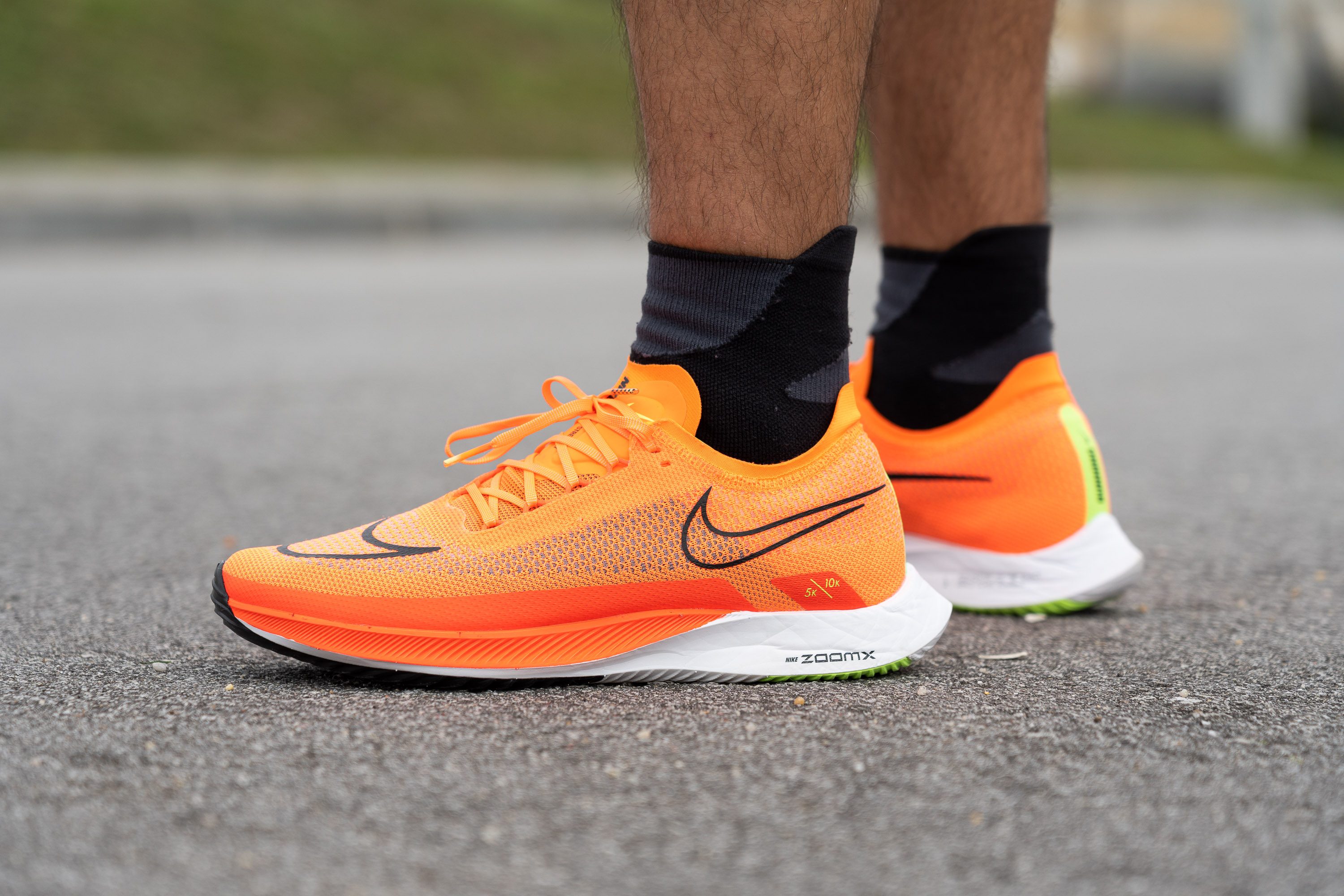
Who should NOT buy it
You won’t get that trampoline-like feeling of a carbon-plated racer with the Nike ZoomX Streakfly. For a genuine 5K/10K racer, check the ASICS Metaspeed Edge+.
On the other hand, if you love long-distance races like we do, the Nike Vaporfly 3 high-stack platform will do wonders for half-marathons and beyond.
A magnificent shoe, but not the one we expected
At every 5K or mile road race, the same question arose: when will Nike unveil a lighter, lower-stacked Vaporfly for us? Finally, the day arrived, but as great as it is, this was not the hyper-propulsive shoe that we anticipated.
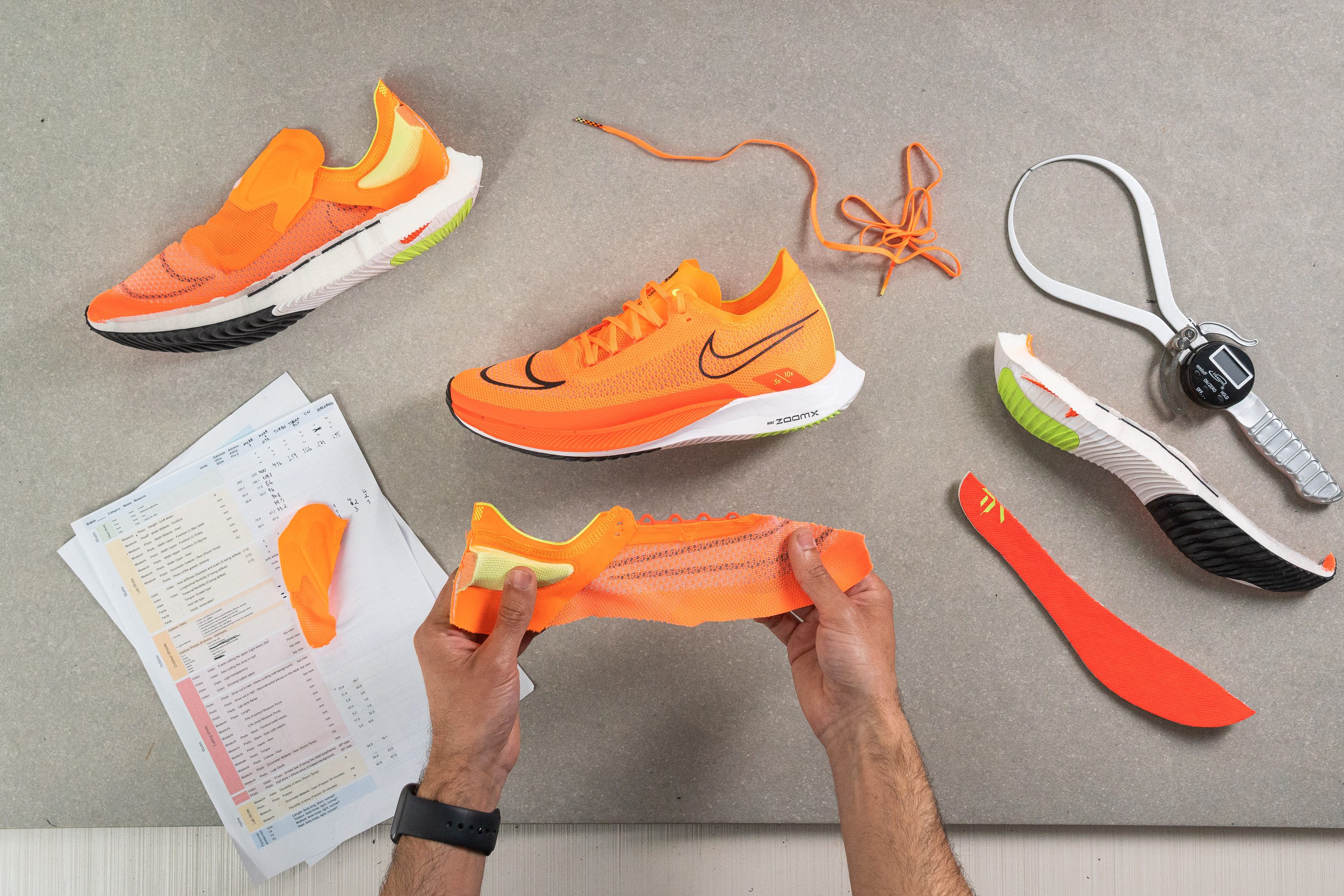
The shoe reminded us of the Pegasus Turbo. This is not a compliment, unfortunately, as it's clear that the Streakfly won't be entering the ranks of super shoes any time soon.
A really breathable upper
Nike ZoomX Streakfly (left) vs. Adidas Runfalcon (right)
Summer training is not a problem with the Nike ZoomX Streakfly. Regardless of your location, this shoe's upper made of engineered mesh allows air to flow freely, while heat escapes with every stride.
The Streakfly scored a well-deserved 5/5 on our breathability test!
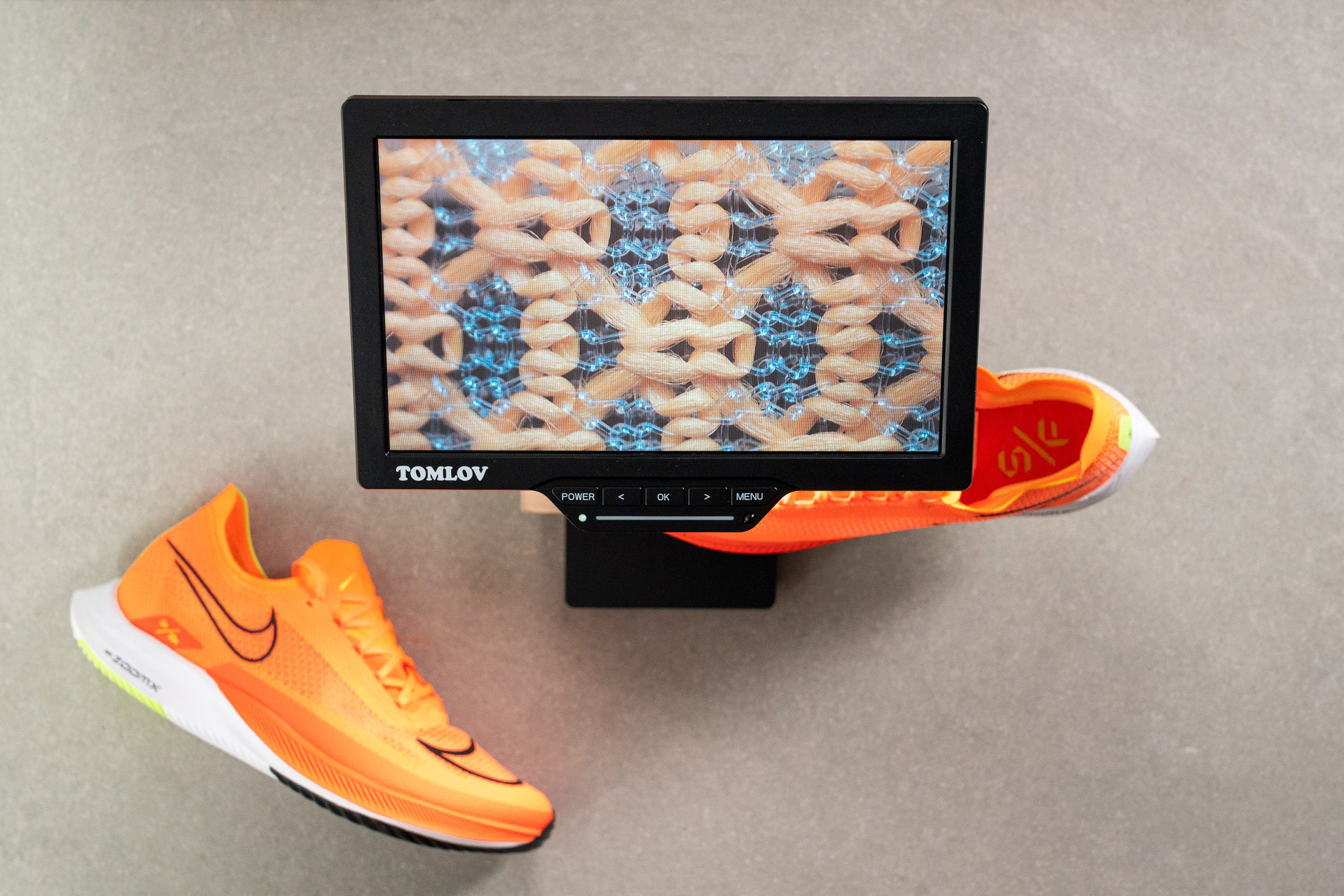
As you can see in the images, the air can flow through the upper without any issue.
 This is a low-breathability (2/5) mesh upper from a Nike Air Zoom Vapor Pro
This is a low-breathability (2/5) mesh upper from a Nike Air Zoom Vapor Pro
And this is Streakfly's mesh upper, which scores 5/5 in our breathability test
Feather-like upper
The Streakfly feels amazingly light and fast. It felt like the shoe fused together with the foot. At a weight of only 6 oz (171g), this shoe is the lightest we've ever measured in our lab.
Remarkably soft and bouncy
The midsole is all you can expect from the acclaimed ZoomX foam: it is soft, bouncy, and comfortable. However, there is a catch. We noticed that the ride got a little too soft for a pace above 4 min/km. This is worrisome because the shoe is marketed for 5K/10K races, so if it bottoms out at faster paces, it may not be suitable for its intended purpose.
Based on this, the Streakfly will work better for runners who strike midfoot-to-forefoot, as they distribute the weight more evenly across the shoe, in contrast to those who strike the ground with their heel.
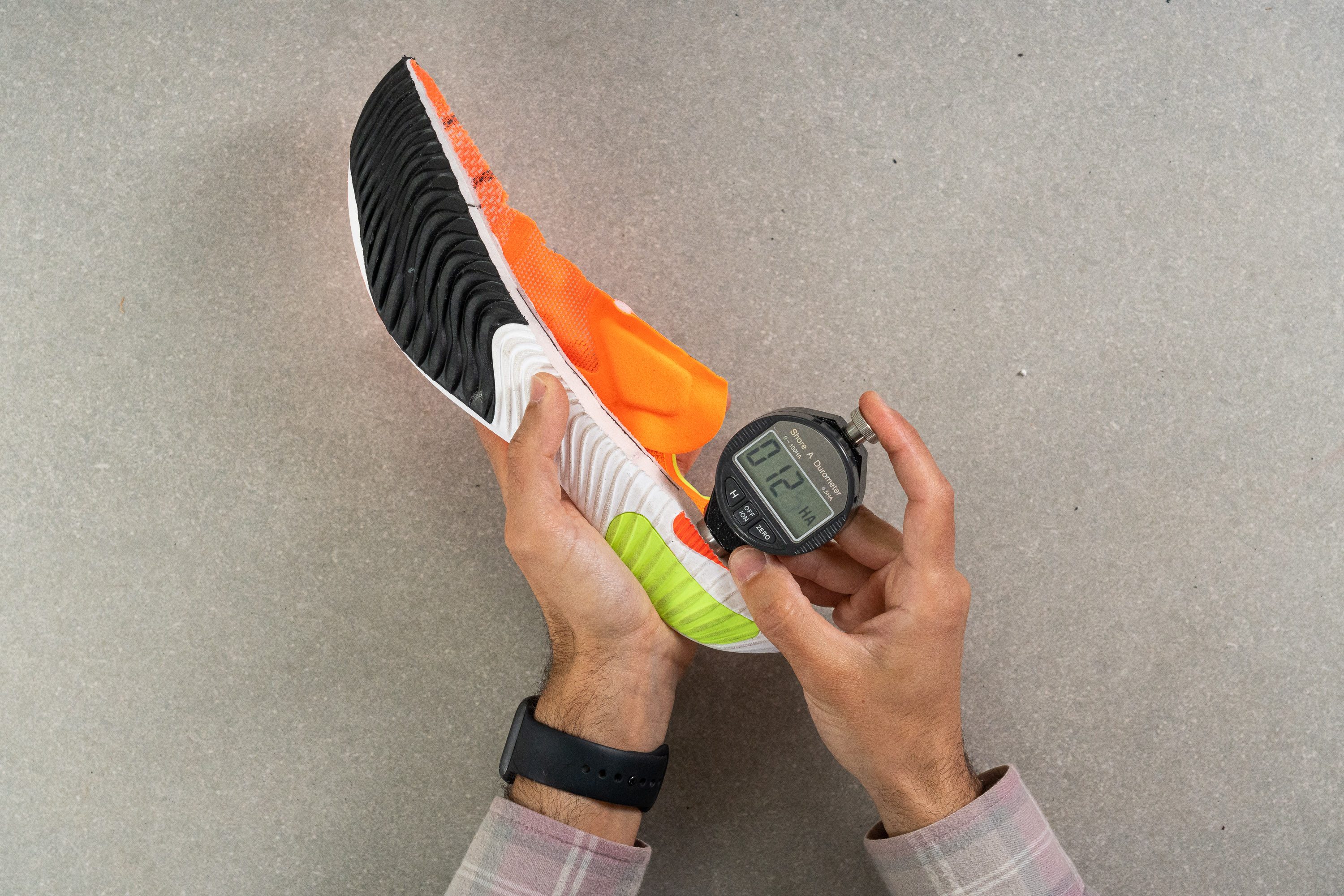
Our durometer measurement confirmed these concerns—at 12.1 HA, the Streakfly is a magnificent 100% softer than the average road shoe!
Disclaimer: We calculate the average of four durometer measurements, disregarding any outliers. The photo above shows one of the takes.
Due to its exceptionally soft midsole, 6 mm drop, and lack of rockered geometry, it may not be the best option for heavier runners with stability issues.
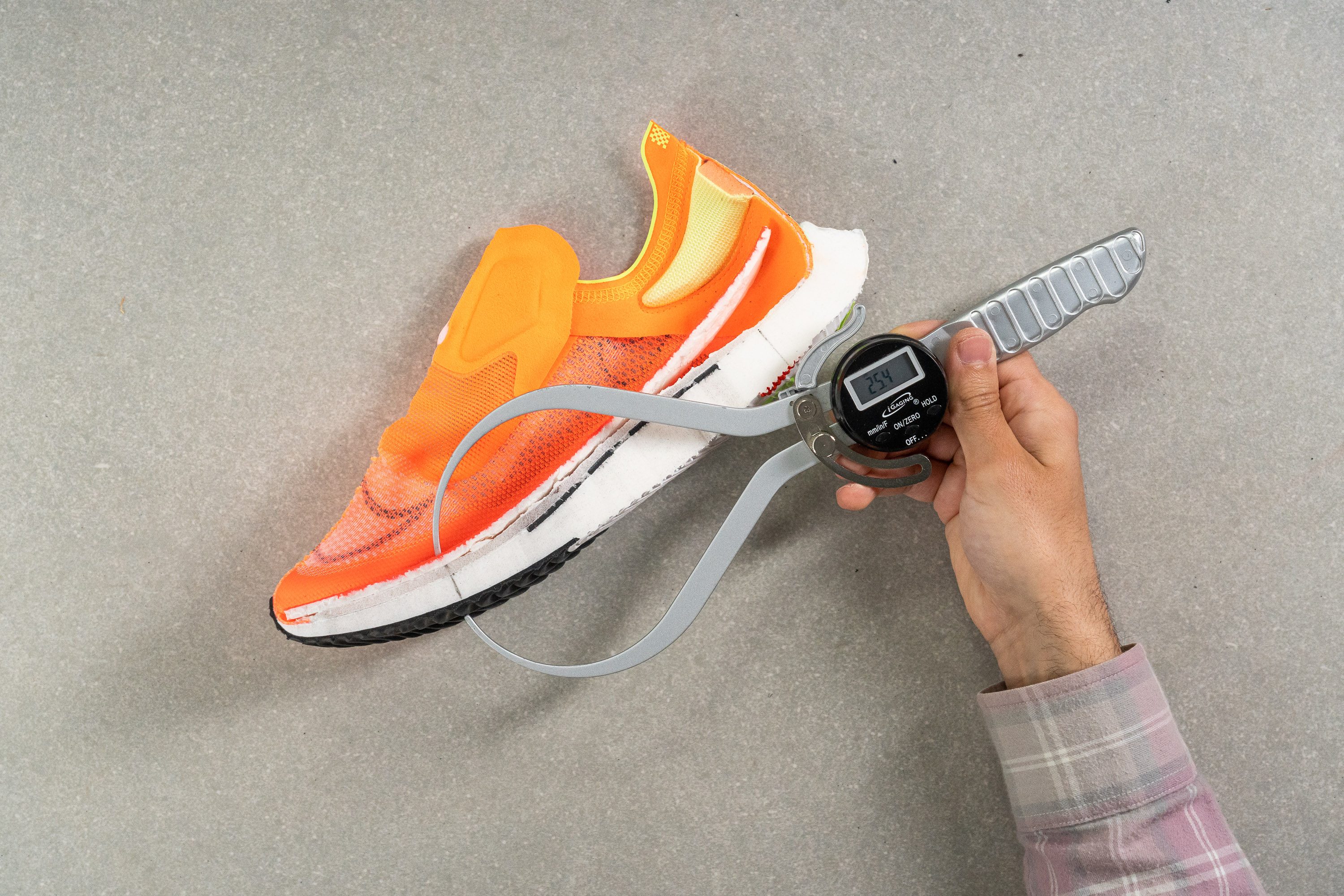
The official drop measurement from Nike is 6 mm, whereas, in our lab, we measured it at 6.3 mm. It's truly great when brands provide accurate drop measurements, right?
Disclaimer: We always include insoles in our stack measurements.
Subpar lacing experience
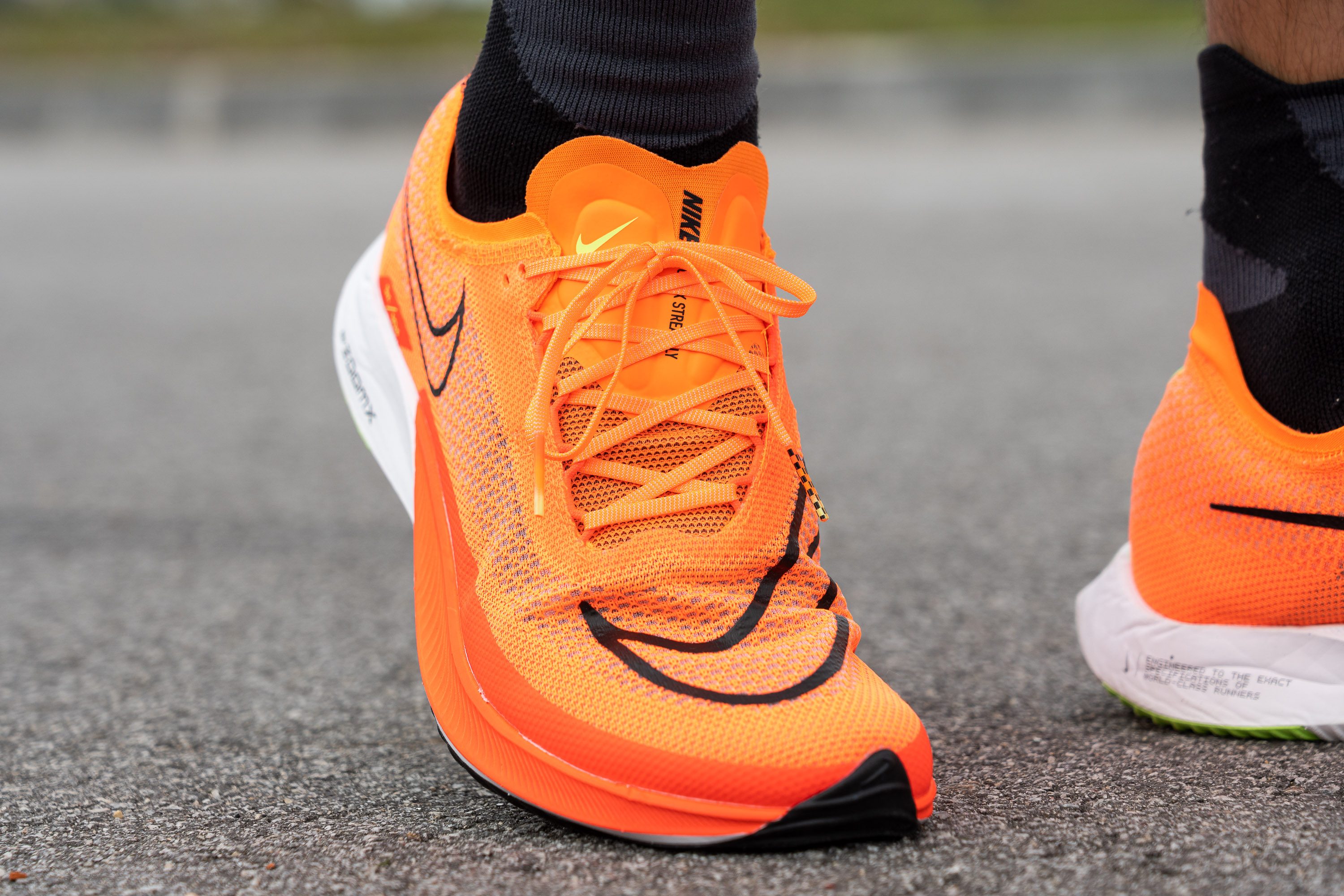
This shoe features a Vaporfly-inherited offset lacing system with flat slip-prone laces that go through large loops instead of eyelets.
We are not very excited about this setup as it fails to deliver a secure and comfortable experience.
No plate, no party?
No carbon plate here.
For better (lower MSRP) or worse (less springy ride), this modern racing flat only sports a small Pebax midfoot shank that is barely noticeable and allows the shoe to flex without almost any resistance.
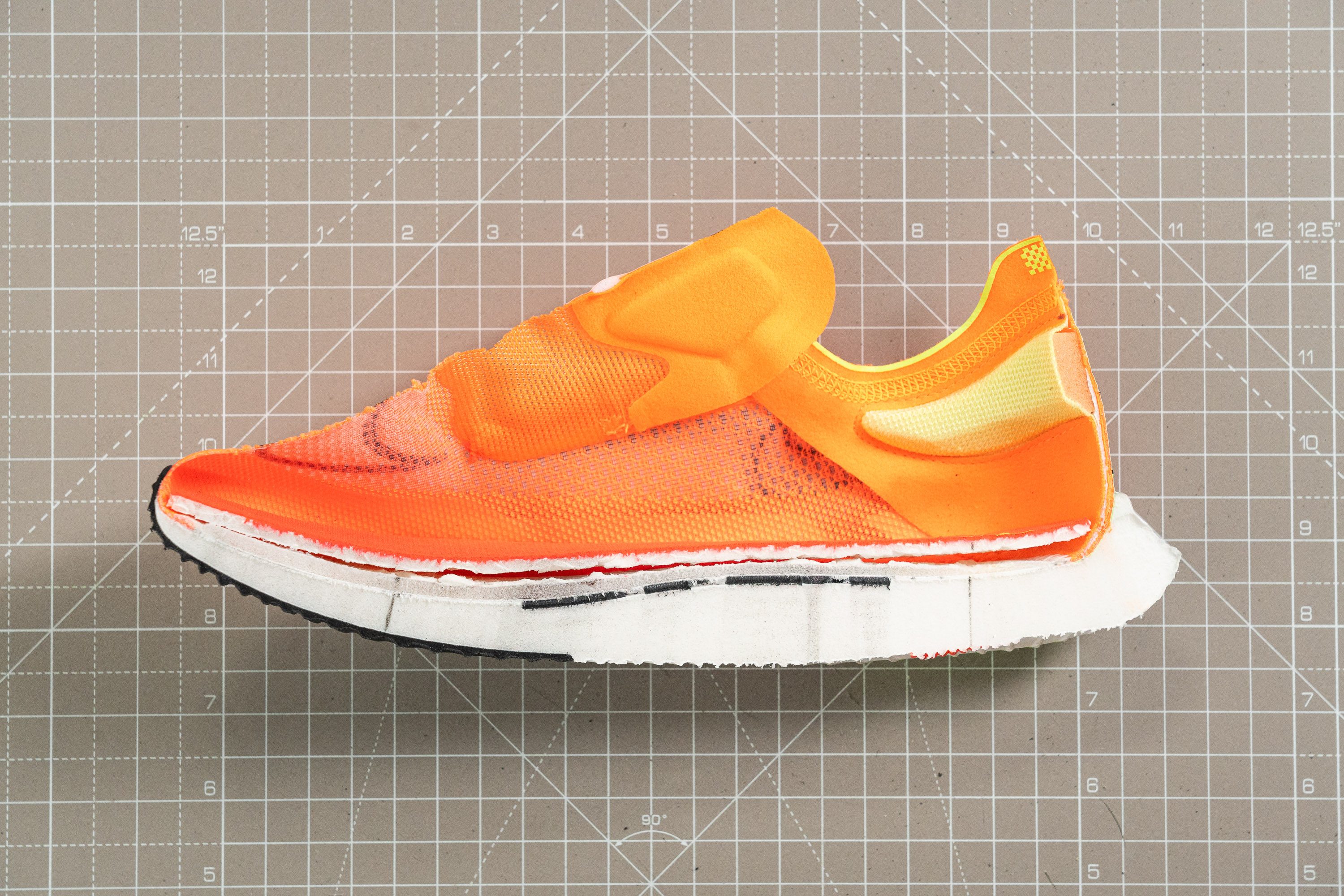
However, the lack of a full carbon-fiber plate has some other positive effects. For instance, it enhances the shoe's ability to turn tight corners while also making it more comfortable for training at easy or recovery paces.
Disclaimer: Please be advised that we take an average of 4 measurements and exclude any outliers. This video shows just one of our measurements.
Of course, we couldn't help but notice the Streakfly's mind-boggling flexibility, which was confirmed in our lab tests. The shoe required 133%(!) less force to bend up to 90 degrees than other running shoes in our lab. This is remarkable even for a non-plated and unstructured shoe.
The Nike ZoomX Streakfly delivers an exceptional and secure fit
Streakfly's upper provides unbeatable comfort thanks to its generously thick (4.8 mm) fully gusseted tongue.
To give you an idea, the beloved ASICS Metaspeed Sky+ has a paper-thin tongue measuring only 0.8 mm, which is enough for most runners. In comparison, this tongue is 5x as thick!
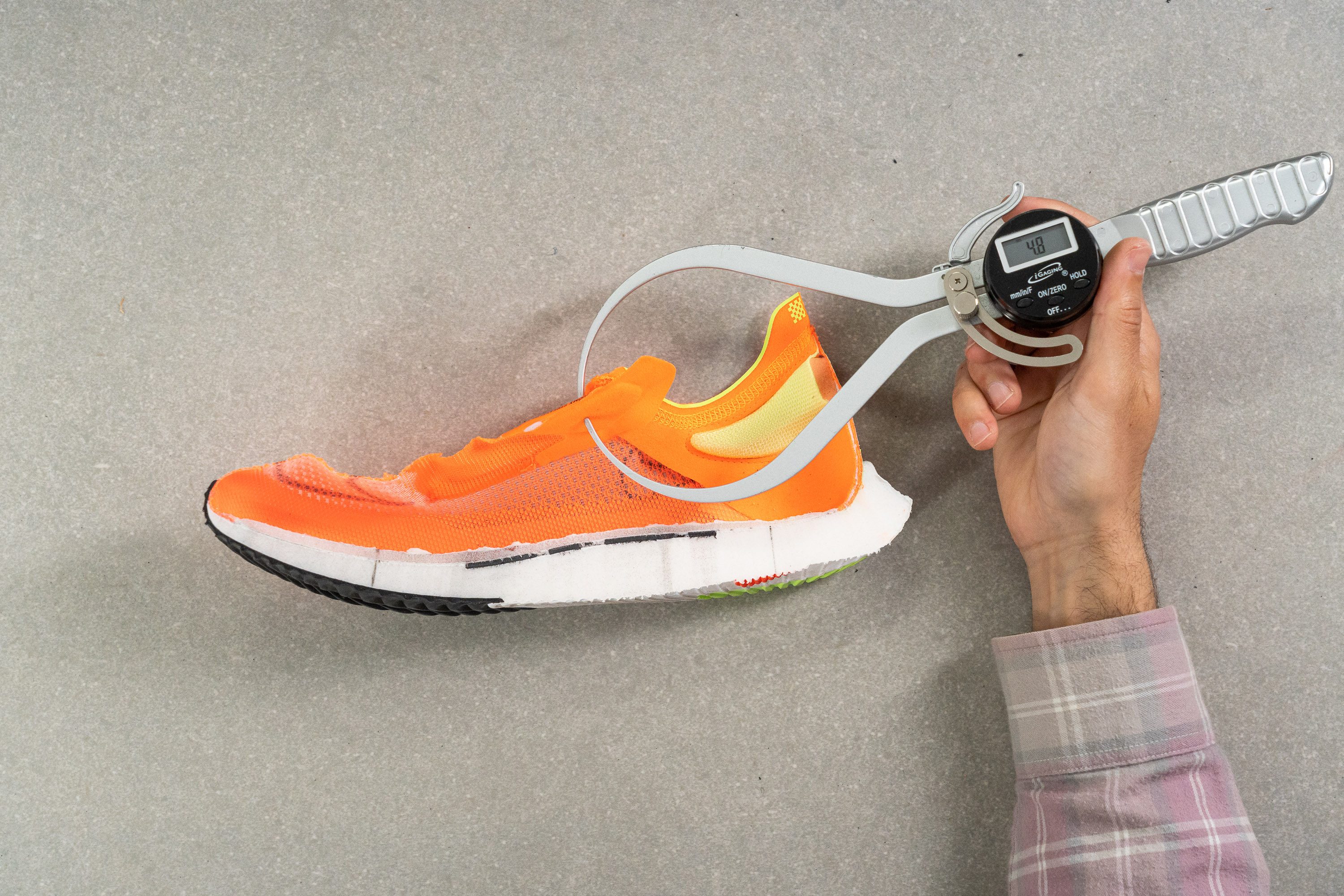
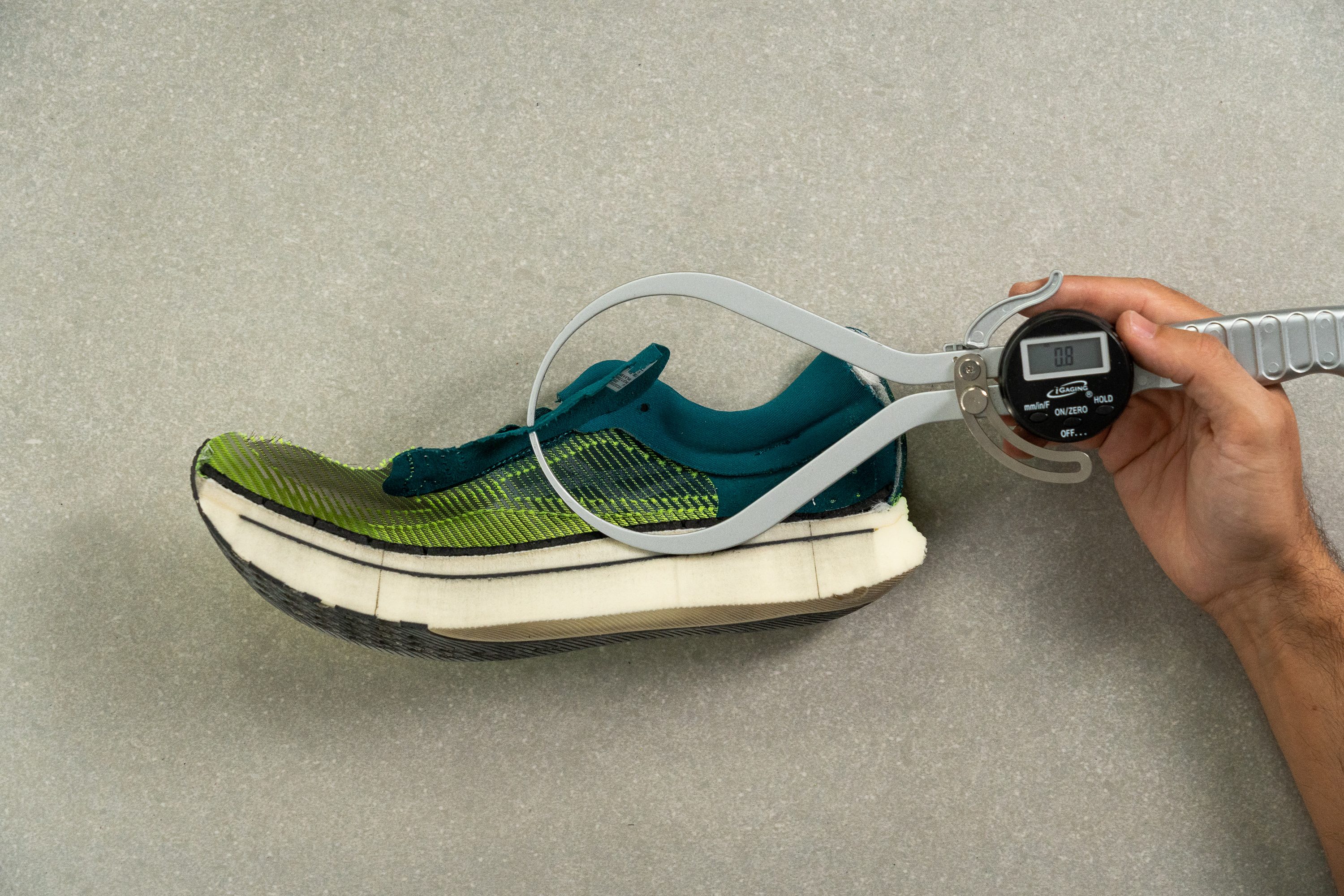
The thick padding inside the heel keeps your feet secure without adding excess weight. Most runners won’t have any problem, but if you experience any heel slippage, we suggest trying an alternative lacing technique from this guide.
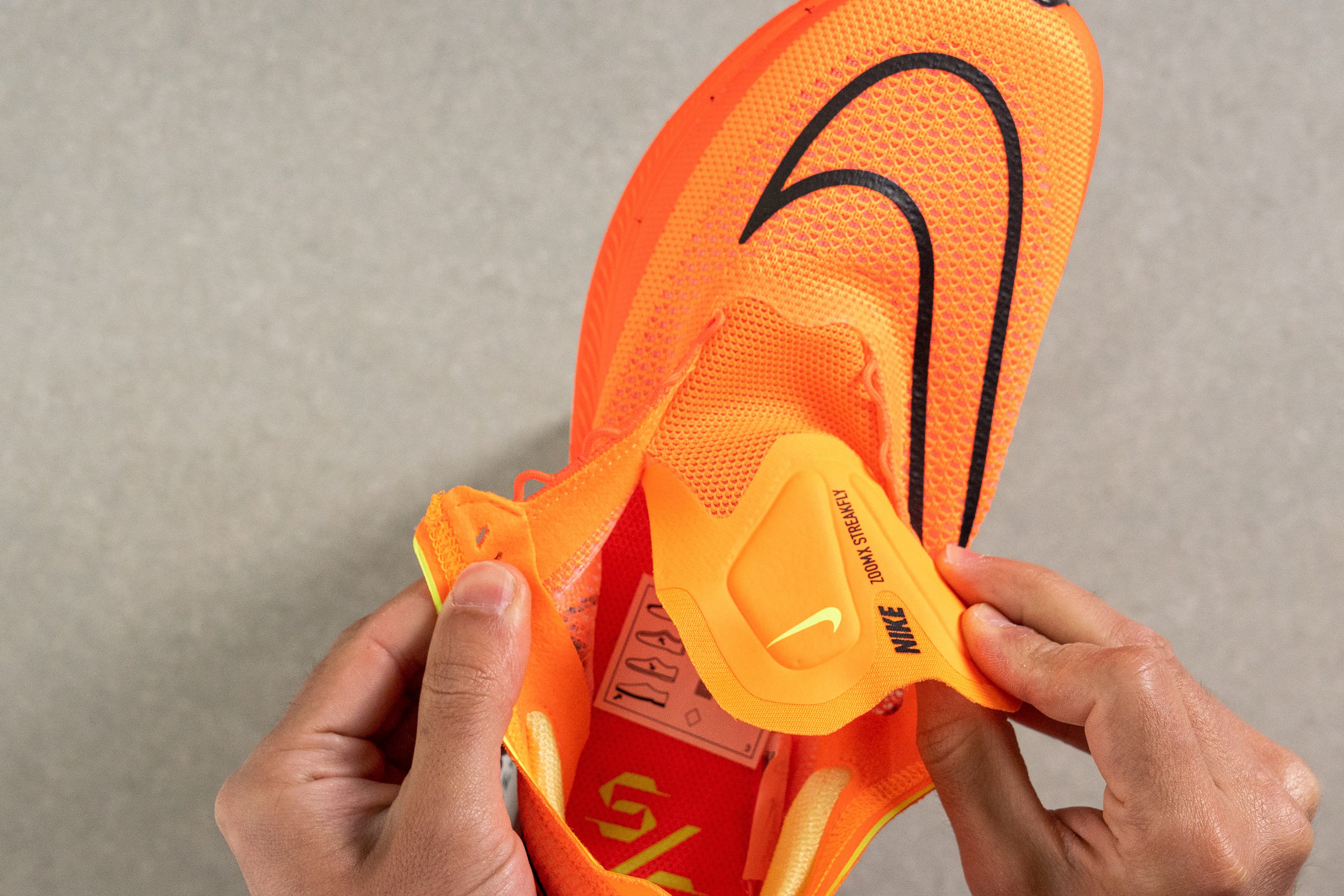
Well, if you need to use a runner's knot, it typically indicates the absence of a rigid heel counter. That correlates with our findings in the lab, as on a 1-to-5 scale—where 5 is the stiffest—we rated it at 1!
Pain cave ready
The Nike ZoomX Streakfly excels on the treadmill at any speed:
- The cushioning of the treadmill complements the shoe's lower stack—in comparison to most supershoes—and soft foam, providing exceptional comfort and stability.
- Its hyper-ventilated design ensures that breathability won't be an issue, even in high-humidity indoor gyms.
- The outsole of the shoe will last longer when used on the treadmill due to the reduced friction compared to roads or soft trails.
Recovery, aerobic, tempo, intervals…
This shoe delivers a great experience across many paces if you keep the distance short. Because it is such an unstructured shoe, anything longer than 10 km becomes uncomfortable.
But for distances below 6 miles or 10K, you can trust this shoe for fartleks, tempo intervals, and even your slowest recovery runs, and benefit from the outstanding and hyper-plush ZoomX foam.
Outsole: hard rubber and exposed foam
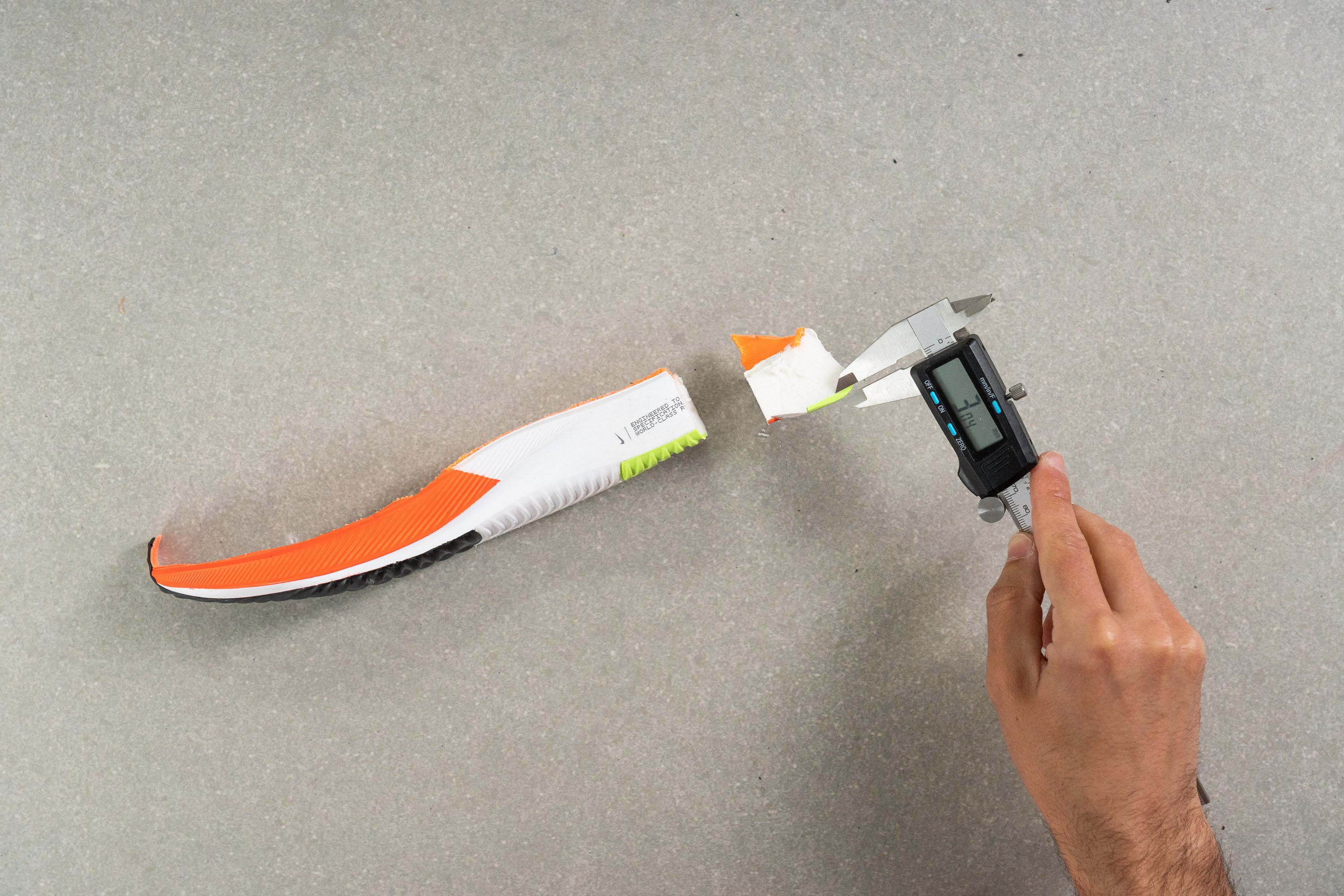
The forefoot offers a substantial block of hard and grippy rubber that goes down to the midfoot, with some borrowed details from the really durable first-generation Alphafly. In contrast, the midfoot reveals exposed ZoomX foam.
On the other hand, the heel features double 3.0 mm-thick rubber pads, protecting a sensitive area from wear and tear. That seems enough and it's really close to the average measurement of 3.4 mm.
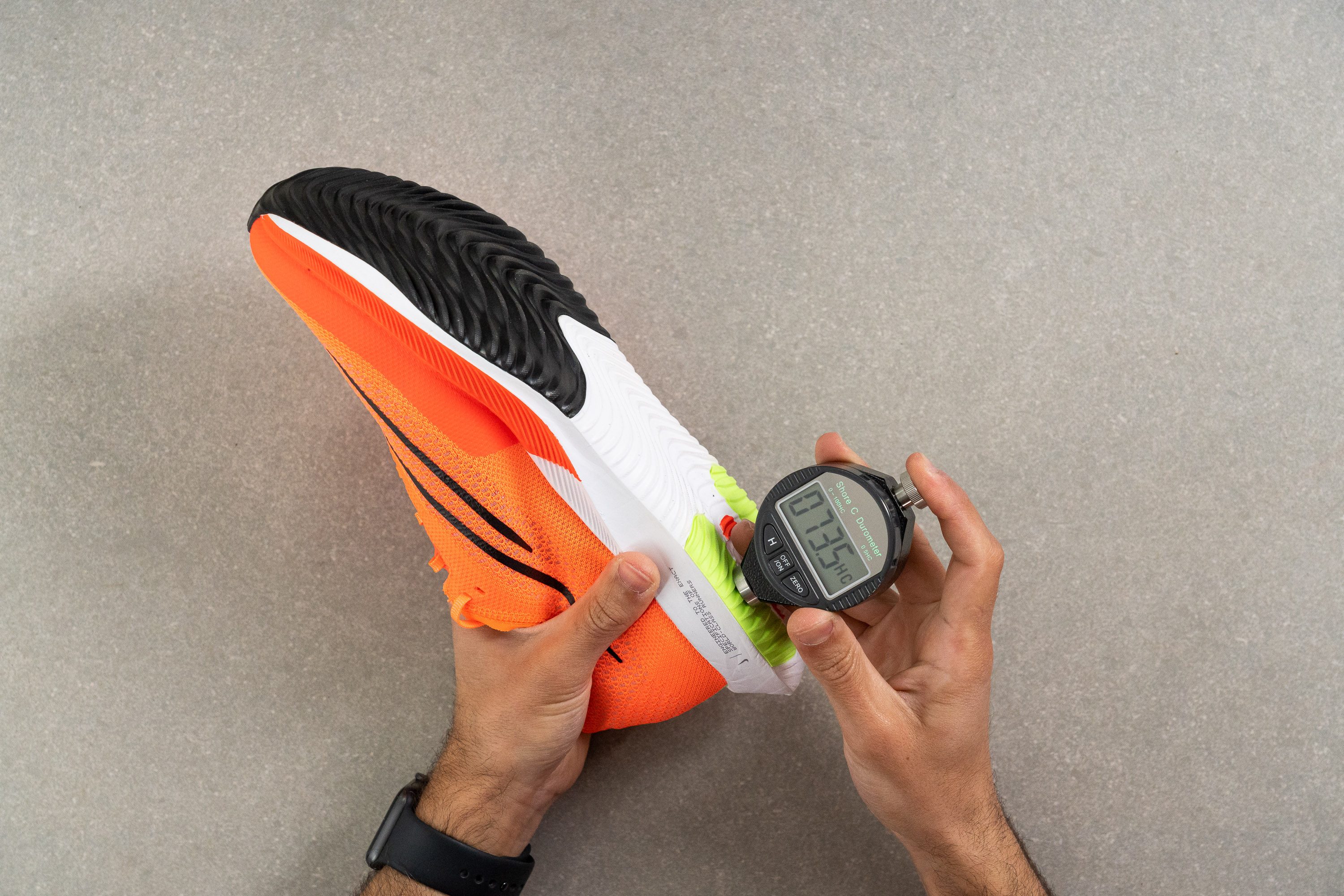
Seems obvious that the higher your forefoot impact, the longer this shoe will last.
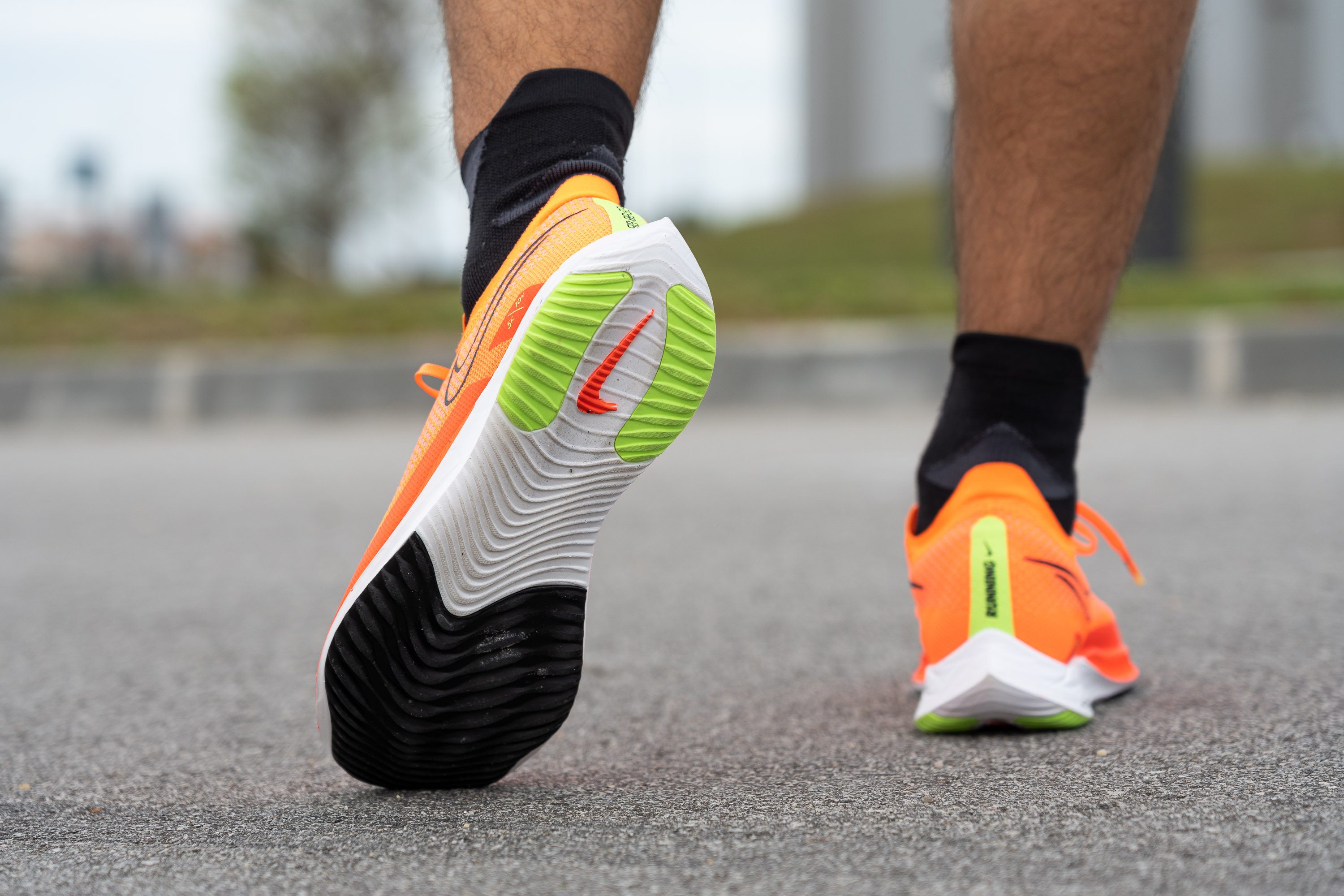
A lot of real estate for a Nike racer
We felt pretty comfortable in the Streakfly's upper as it was just enough tight. Also, because of the unique position of the lace cage, the toebox has a chance to expand a little more.
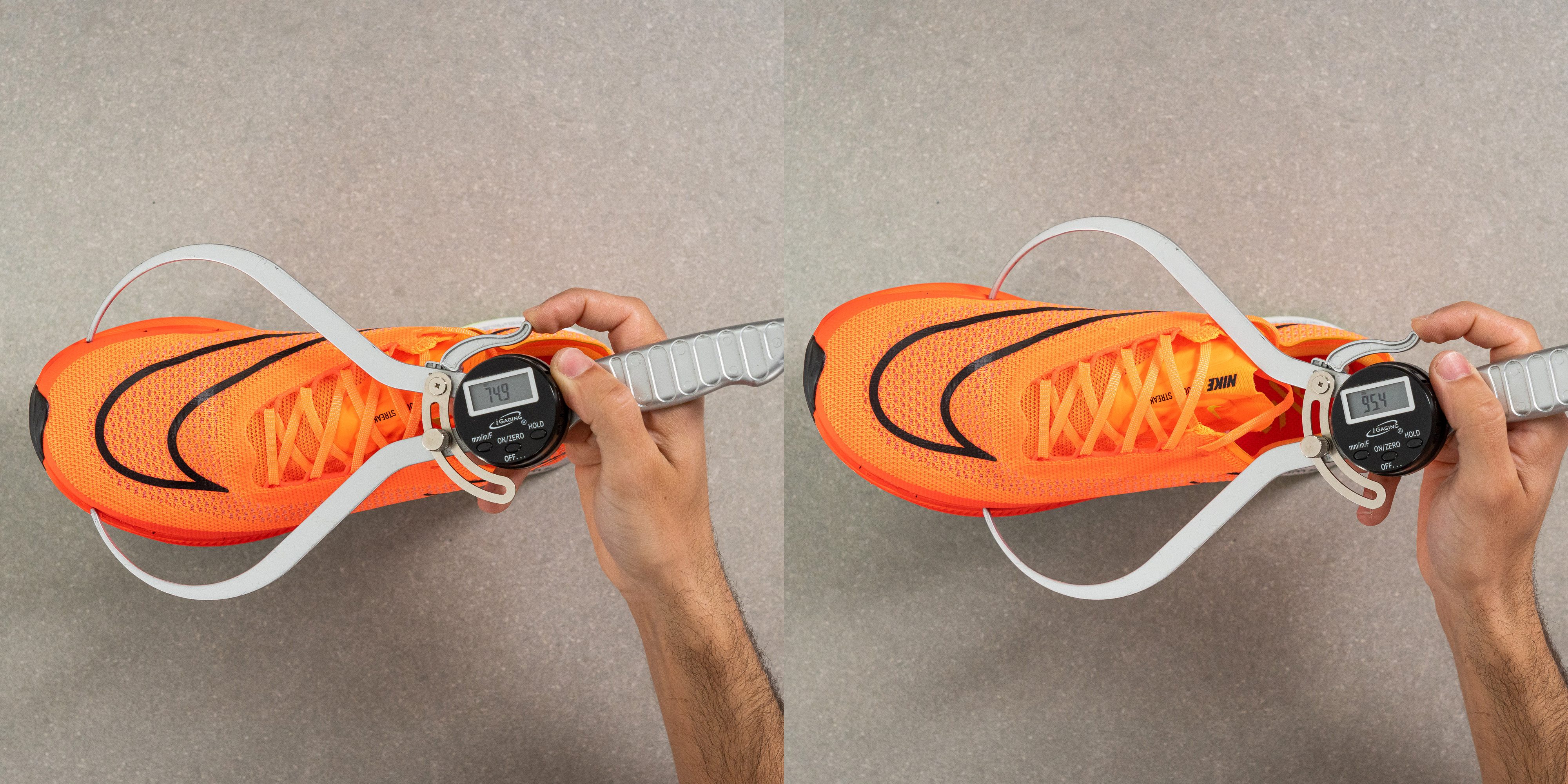
We've taken two measurements in the toebox instead of one to provide you with a better understanding of how comfortable your feet will be in this shoe.
The Nike ZoomX Streakfly (95.4 mm / 74.9 mm) only narrows by 27.4% between our two measuring points, while the Nike Zoom Fly 5 (95.0 mm / 71.1 mm) reduces its space by 33.6% in the front area.
Based on this, it’s no surprise that the Streakfly is a fantastic choice for runners with medium to wide feet.
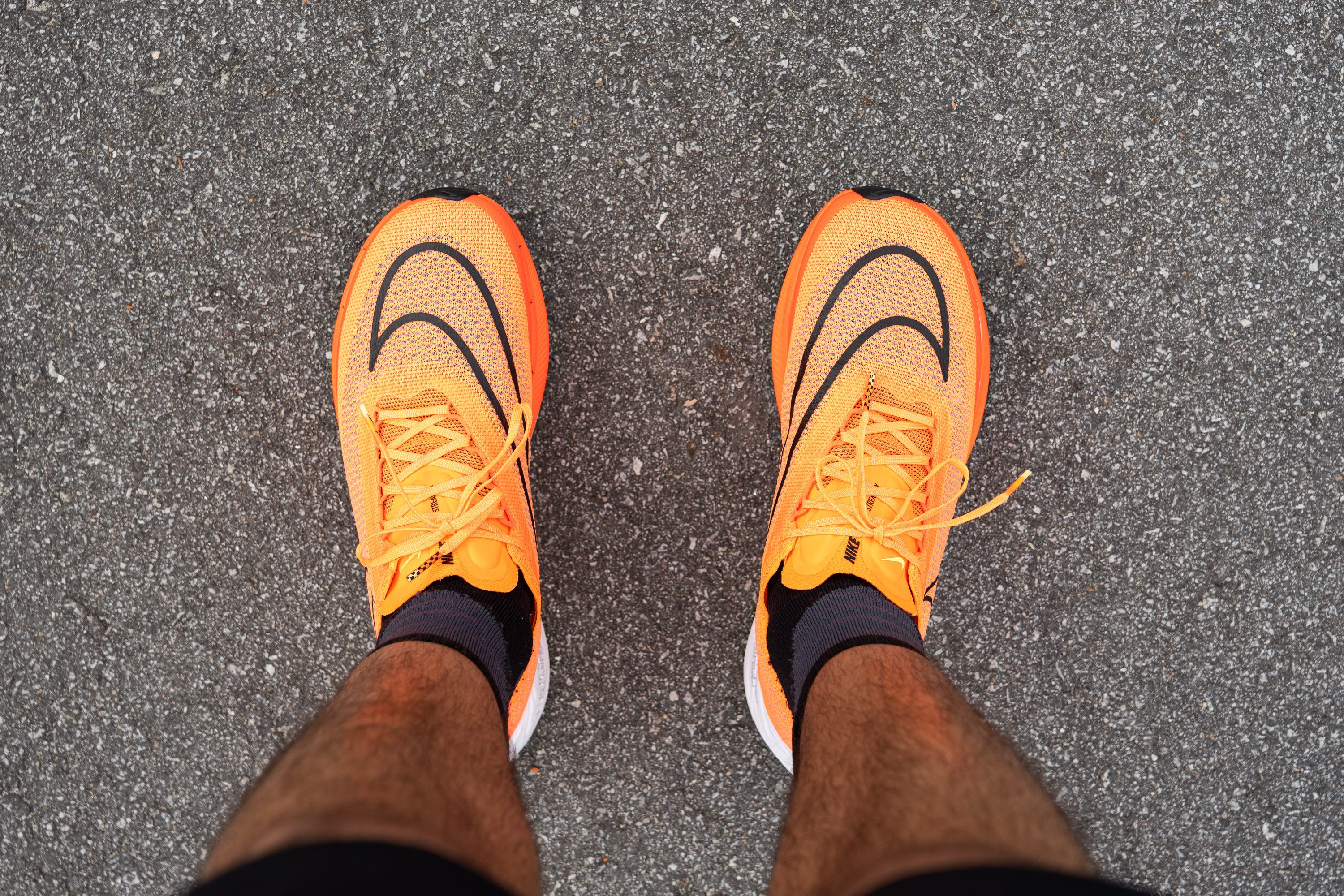
However, if you have narrow feet, it’s a good idea to try it on first. You may have to wear your thickest socks in order to fill the space in the shoe.
Cold-proof, with a caveat
Embrace winter workouts outside with ease alongside the Streakfly! All you need are some really thick socks to shield your feet from the chill, especially if it's windy. This can be a plus if you have narrow feet, as stated before.
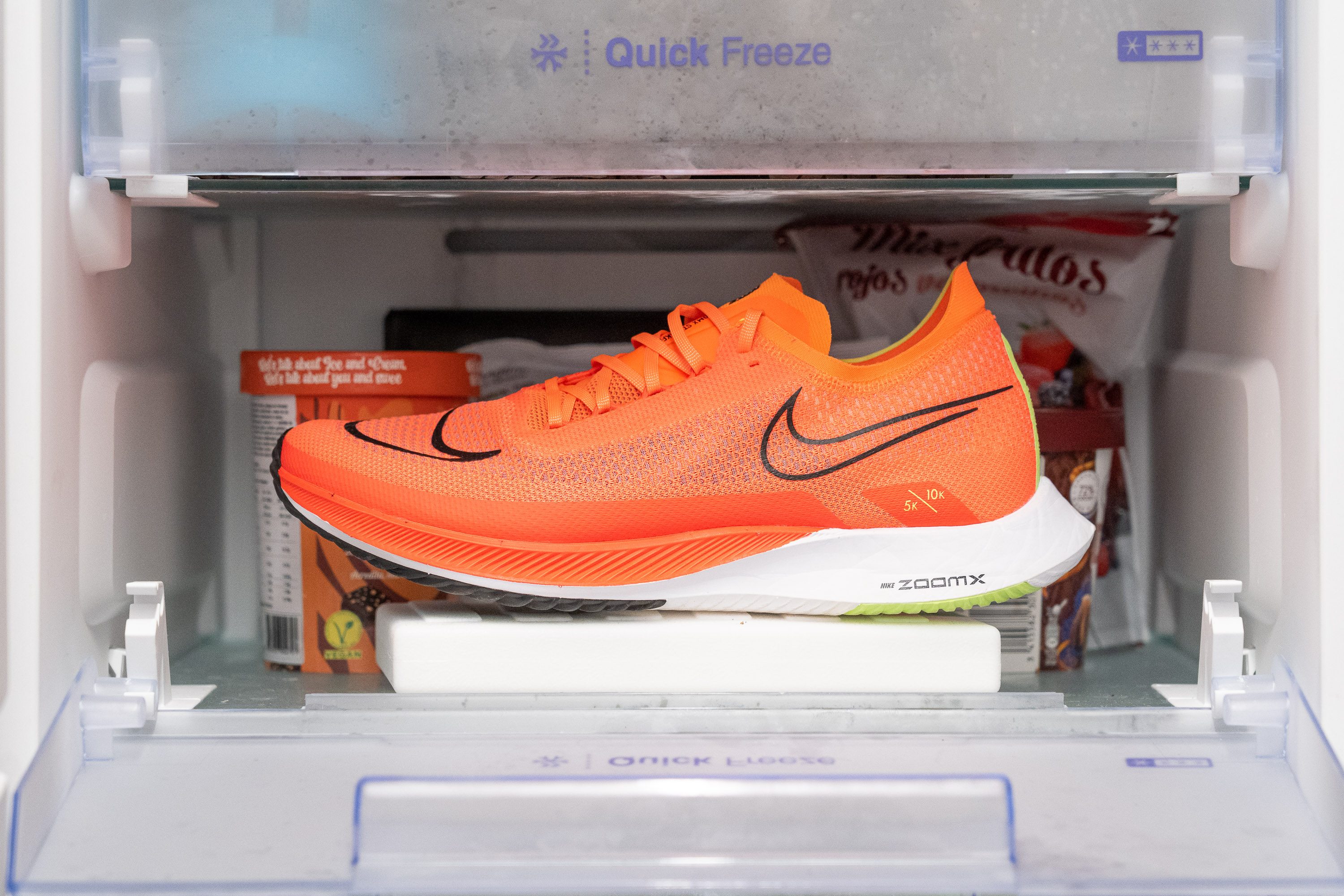
On average, shoes harden by 26.9% after spending 20 minutes in our freezer. However, the Streakfly's cold-resistant PEBA-based foam only does it by 16.5%.
And what about stiffness changes based on temperature? The Streakfly excels one more time despite not having a carbon-fiber plate. Unlike the average shoe, which becomes 43.6% stiffer, the Streakfly only does it by 19.0%. Impressive, right?
Exceptional value for its price
With an MSRP of $160, the Nike ZoomX Streakfly is cheaper than a Nike Pegasus Turbo 2 when it was released. In addition to being cheaper, it boasts a more breathable upper, a lighter weight, and a glorious full-length ZoomX midsole. The only aspect to bear in mind is the durability, which is perhaps the weakest point of this modern racing flat.
